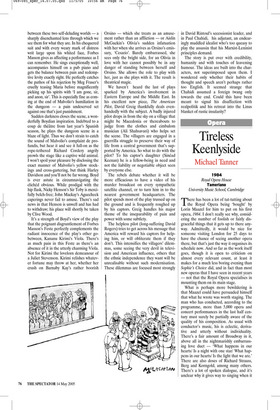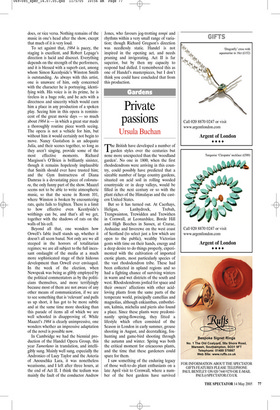Tireless Keenlyside
Michael Tanner
1984 Royal Opera House Tamerlano University Music School, Cambridge There has been a lot of tut-tutting about the Royal Opera being ‘bought’ by Lorin Maazel for him to put on his first opera, 1984. I don’t really see why, considering the number of foolish or fairly disgraceful things that it gets up to there anyway. Admittedly, it would be nice for someone visiting London for 25 days to have the chance of seeing another opera there, but that’s just the way it organises its schedule now. And so far as the work itself goes, though it is open to criticism on almost every relevant count, at least it makes for a much less boring evening than Sophie’s Choice did, and in fact than most new operas that I have seen in recent years — not that the Royal Opera specialises in mounting them on its main stage.
What is perhaps more bewildering is that Maazel could have persuaded himself that what he wrote was worth staging. The man who has conducted, according to the programme, more than 5,000 opera and concert performances in the last half century must surely be partially aware of the quality of his composition. As usual with conductor’s music, his is eclectic, derivative and utterly without individuality. There’s a fair amount of Broadway in it, above all in the nightmarishly embarrassing love duet — ‘What happens in our hearts/ Is a night with one star/ What happens in our hearts/ Is the light that we are.’ There are also doses of Richard Strauss, Berg and Korngold, among many others. There’s a lot of spoken dialogue, and it’s unclear why it gives way to singing when it does, or vice versa. Nothing remains of the music in one’s head after the show, except that much of it is very loud.
To set against that, 1984 is pacey, the staging is excellent, and Robert Lepage’s direction is lucid and discreet. Everything depends on the strength of the performers, and it is blessed with a superb cast, among whom Simon Keenlyside’s Winston Smith is outstanding. As always with this artist, one is unaware of him, only concerned with the character he is portraying, identifying with. His voice is in its prime, he is tireless in a huge role, and he acts with a directness and sincerity which would earn him a place in any production of a spoken play. Seeing him in this opera is reminiscent of the great movie days — so much about 1984 is — in which a great star made a thoroughly routine piece worth seeing. The opera is not a vehicle for him, but without him it would certainly not begin to move. Nancy Gustafson is an adequate Julia, and their scenes together, so long as they aren’t singing, provide some of the most effective moments. Richard Margison’s O’Brien is brilliantly sinister, though it remains hopelessly implausible that Smith should ever have trusted him; and the Gym Instructress of Diana Damrau is a devastating piece of coloratura, the only funny part of the show. Maazel seems not to be able to write atmospheric music, so that the scene in Room 101, where Winston is broken by encountering rats, quite fails to frighten. There is a limit to how effective even Keenlyside’s writhings can be, and that’s all we get, together with the shadows of rats on the walls of his cell.
Beyond all that, one wonders how Orwell’s fable itself stands up, whether it doesn’t all seem banal. Not only are we all steeped in the horrors of totalitarian regimes; we are all subject to the full incessant onslaught of the media at a much more sophisticated stage of their hideous development than Orwell ever envisaged. In the week of the election, when Newspeak was being as glibly employed by the political commentators as by the politicians themselves, and more terrifyingly because most of them are not aware of any other means of communication, if we are to see something that is ‘relevant’ and pulls us up short, it has got to be more subtle and at the same time more shocking than this parade of items all of which we are well schooled in disapproving of. While Maazel’s 1984 is clearly unimpressive, one wonders whether an impressive adaptation of the novel is possible now.
In Cambridge we had the biennial production of the Handel Opera Group, this year Tamerlano in translation, and intelligibly sung. Mainly well sung, especially the Andronico of Lucy Taylor and the Asteria of Anouschka Lara, it was nonetheless wearisome, and I left after three hours, at the end of Act II. I think the tedium was mainly the fault of the conductor Andrew Jones, who favours jog-trotting tempi and rhythms within a very small range of variation; though Richard Gregson’s direction was needlessly static. Handel is not inspired in the opening act, and needs pruning and invigorating. Act II is far superior, but by then my capacity to respond had dulled. I remembered this as one of Handel’s masterpieces, but I don’t think you could have concluded that from this production.



































































 Previous page
Previous page